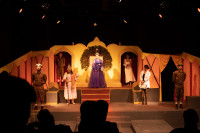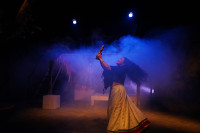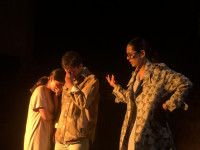Theater
Tragedy of Macbeth finds home in Kathmandu
One World Theatre’s rendition of ‘Macbeth’ fuses Shakespearean dialogues with Giuseppe Verdi’s opera, with dramatic results.
Urza Acharya
Nepal is no stranger to tragedies. But for some reason, out of all the Shakespearean creations, Macbeth feels the most apt for our climate. Perhaps it’s the fact that the royal family was wiped out in a single night (mirroring King Duncan) or that confused, chaotic leaders keep taking over the political helm, Nepal’s political history is just as if not more absurd—and macabre—than the three witches’ prophecies.
And that is one of the reasons why Deborah Merola, the artistic director of One World Theatre (OWT), chose Macbeth as the theatre’s newest production. OWT is a theatre company based in Kathmandu that produces intercultural, socially aware productions, mainly from South Asia. This iteration, titled ‘Macbeth Massacre’, moves beyond a simple adaption, mixing in Italian composer Giuseppe Verdi’s opera on Macbeth, leaving for an evening of the musical feast.
As one enters Mandala Theatre, one is greeted with a grand and dramatic setting. There’s a sort of bleakness on stage—off-white, torn fabrics dominate the area. A tall and naked pillar made of intertwined steel rods stands on the side. We are then introduced to the wayward sisters (played perfectly weirdly by Pashupathi Rai, Saroj Aryal and JL Son Adhikari)—dressed in eccentric clothes—their uncanny crawls foreshadowing the doom that is about to ensue.
From the first scene itself, ‘Macbeth Massacre’ abandons the classic tropes of a Shakespearean play, and this is for the better. A very honest adaptation—with the gaudy Elizabethian dresses—accompanied by heavy dialogues would’ve gotten lost in translation, especially for the Nepali audience. We’re notorious creatures of habit and familiarity. The costumes that the characters wear are modern, hip and some even absurd, and it’s fascinating to see what the characters will don next.
Another beauty of the play is the fusion of two languages—Nepali and English—to create an ambience that’s new and yet comforting at the same time. Lord Macbeth, played by Rajkumar Pudasaini, shifts to Nepali monologues to build courage for the murder. His wife, played beautifully by Andi Davis, nonetheless understands. There’s harmony as the two languages merge. Nepali also acts as a bridge to the audience, allowing modern contexts to seep in—a jab or two about our politicians—which grounds the play.
Macbeth’s tragedy is nothing new. But what’s new, at least here, is that we get to see and hear Verdi’s opera and witness how (and why) this iconic story has become a staple of the operatic repertoire across the globe. Roy Stevens performs as the operatic version of Macbeth, followed by Annalisa Winberg as Lady Macbeth and Jillian Khuner as Lady Macduff. As performers with decades of experience, their singing is emotive and cathartic.
Jonathan Khuner, the music director and conductor, accompanied by artists from Kathmandu Jazz Conservatory, weaves in the musical ripples—some soft and slow, others grand. It’s very beautiful to listen to.
For a lot of the urban populace—it was for me—this might be our first time listening to an opera. And it’s a great place to start because the artists are not only great at what they do, there’s also a zeal in their sopranos and baritones. Anyone with a penchant for Western classical music will enjoy the play.
The sizable cast of over 30 individuals—which also involves a youth ensemble from The British School—come together to re-create the bloody, vengeful journey of Macbeth and Lady Macbeth as their momentary spiral causes doom to an entire state.
It is important to note that Pudasaini was accused of sexual misconduct by his theatre peers in 2019. After the revelation, OWT disbarred him for a year.
Though there were Nepali dialogues and contexts, there could’ve been more of that local touch. The long and complex Shakespearean lingo is a rather tiresome one for Nepali tongues, more dialogues in Nepali would’ve put the actors at ease—especially in the case of Lord Macbeth. But with such a large cast and restrictions in time, Director Merola revealed that it was difficult to find good translators. Nonetheless, Macbeth Massacre offers a refreshing take on the age-old tragedy.
The play will continue till May 28 at Mandala Theatre, Thapagaun, Kathmandu.




 8.69°C Kathmandu
8.69°C Kathmandu










